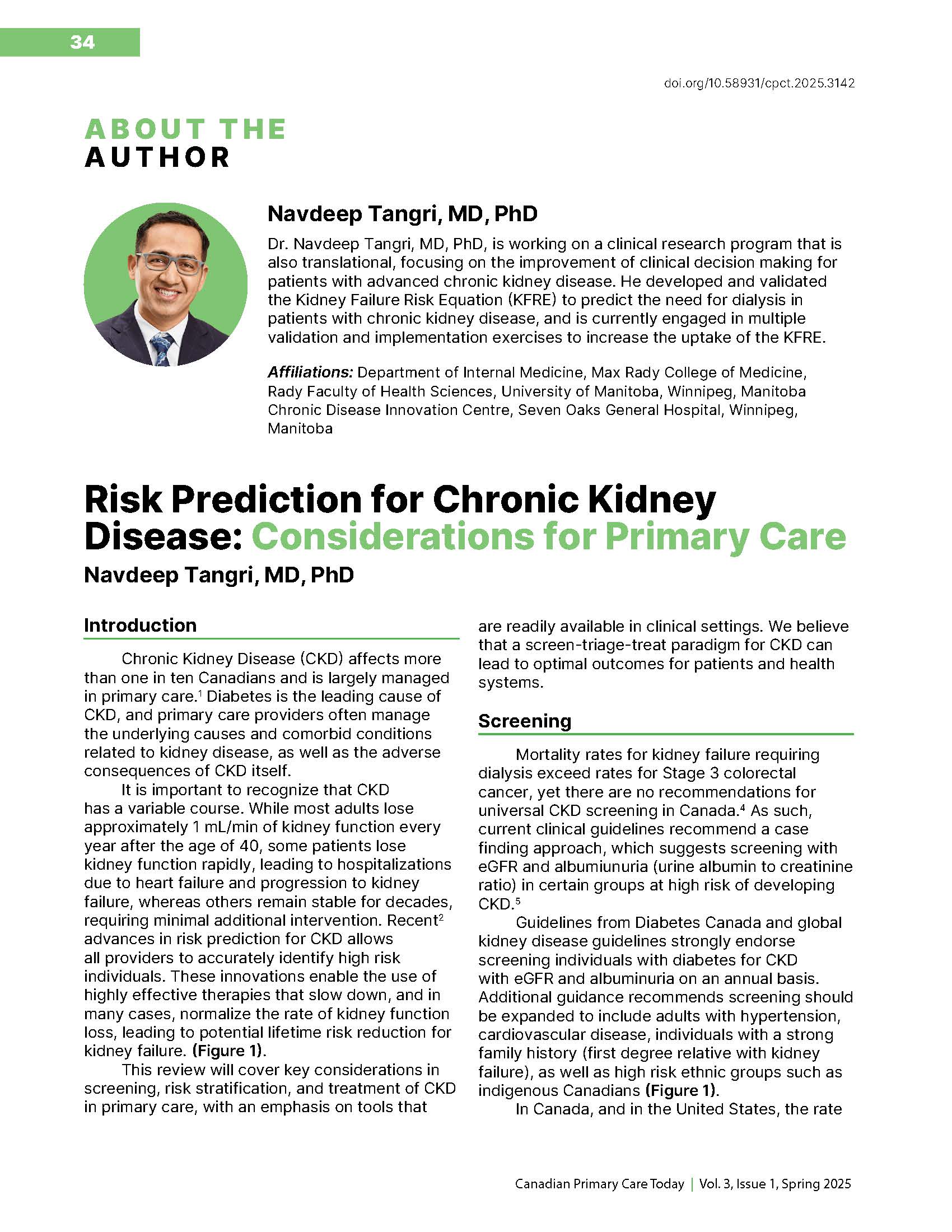Risk Prediction for Chronic Kidney Disease: Considerations for Primary Care
DOI:
https://doi.org/10.58931/cpct.2025.3142Abstract
Chronic Kidney Disease (CKD) affects more than one in ten Canadians and is largely managed in primary care. Diabetes is the leading cause of CKD, and primary care providers often manage the underlying causes and comorbid conditions related to kidney disease, as well as the adverse consequences of CKD itself.
It is important to recognize that CKD has a variable course. While most adults lose approximately 1 mL/min of kidney function every year after the age of 40, some patients lose kidney function rapidly, leading to hospitalizations due to heart failure and progression to kidney failure, whereas others remain stable for decades, requiring minimal additional intervention. Recent advances in risk prediction for CKD allows all providers to accurately identify high risk individuals. These innovations enable the use of highly effective therapies that slow down, and in many cases, normalize the rate of kidney function loss, leading to potential lifetime risk reduction for kidney failure. (Figure 1).
This review will cover key considerations in screening, risk stratification, and treatment of CKD in primary care, with an emphasis on tools that are readily available in clinical settings. We believe that a screen-triage-treat paradigm for CKD can lead to optimal outcomes for patients and health systems.
References
Kitzler TM, Chun J. Understanding the current landscape of kidney disease in Canada to advance precision medicine guided personalized care. Can J Kidney Health Dis. 2023;10:20543581231154185. doi:10.1177/20543581231154185. PMID: 36798634; PMCID: PMC9926383. DOI: https://doi.org/10.1177/20543581231154185
Li L, Astor BC, Lewis J, Hu B, Appel LJ, Lipkowitz MS, et al. Longitudinal progression trajectory of GFR among patients with CKD. Am J Kidney Dis. 2012;59(4):504–12. doi:10.1053/j.ajkd.2011.12.009. PMID: 22284441; PMCID: PMC3312980. DOI: https://doi.org/10.1053/j.ajkd.2011.12.009
Tangri N. Risk stratification to improve care and outcomes in diabetic kidney disease. Can Diabetes Endocrinol Today. 2024;2(1):5–10. Available from: https://canadiandiabetesandendocrinologytoday.com/article/view/2-1-Tangri
Naylor KL, Kim SJ, McArthur E, Garg AX, McCallum MK, Knoll GA. Mortality in incident maintenance dialysis patients versus incident solid organ cancer patients: a population-based cohort. Am J Kidney Dis. 2019;73(6):765–76. doi:10.1053/j.ajkd.2018.12.011. PMID: 30738630. DOI: https://doi.org/10.1053/j.ajkd.2018.12.011
Diabetes Canada Clinical Practice Guidelines Expert Committee. Diabetes Canada 2018 clinical practice guidelines for the prevention and management of diabetes in Canada. Can J Diabetes. 2018;42(Suppl 1):S1–S325. DOI: https://doi.org/10.1016/S1499-2671(17)31026-2
Chu CD, Xia F, Du Y, et al. Estimated prevalence and testing for albuminuria in US adults at risk for chronic kidney disease. JAMA Netw Open. 2023;6(7):e2326230. doi:10.1001/jamanetworkopen.2023.26230. DOI: https://doi.org/10.1001/jamanetworkopen.2023.26230
Tangri N, Stevens LA, Griffith J, Tighiouart H, Djurdjev O, Naimark D, et al. A predictive model for progression of chronic kidney disease to kidney failure. JAMA. 2011;305(15):1553–9. doi:10.1001/jama.2011.451. PMID: 21482743. DOI: https://doi.org/10.1001/jama.2011.451
Tangri N, Grams ME, Levey AS, et al. Multinational assessment of accuracy of equations for predicting risk of kidney failure: a meta-analysis. JAMA. 2016;315(2):164–74. doi:10.1001/jama.2015.18202. DOI: https://doi.org/10.1001/jama.2015.18202
Kidney Disease: Improving Global Outcomes (KDIGO) CKD Work Group. KDIGO 2024 clinical practice guideline for the evaluation and management of chronic kidney disease. Kidney Int. 2024;105(4S):S117–S314. doi:10.1016/j.kint.2023.10.018. PMID: 38490803. DOI: https://doi.org/10.1016/j.kint.2023.10.018
Chu CD, Chen MH, McCulloch CE, Powe NR, Estrella MM, Shlipak MG, et al. Patient awareness of CKD: a systematic review and meta-analysis of patient-oriented questions and study setting. Kidney Med. 2021;3(4):576–85.e1. doi:10.1016/j.xkme.2021.03.014. PMID: 34401725; PMCID: PMC8350814. DOI: https://doi.org/10.1016/j.xkme.2021.03.014
Ferguson T, Ravani P, Sood MM, Clarke A, Komenda P, Rigatto C, Tangri N. Development and external validation of a machine learning model for progression of CKD. Kidney Int Rep. 2022;7(8):1772–81. doi:10.1016/j.ekir.2022.05.004. DOI: https://doi.org/10.1016/j.ekir.2022.05.004
Tangri N, Ferguson T, Leon SJ, Anker SD, Filippatos G, Pitt B, et al. Validation of the Klinrisk chronic kidney disease progression model in the FIDELITY population. Clin Kidney J. 2024;17(4):sfae052. doi:10.1093/ckj/sfae052. PMID: 38650758; PMCID: PMC11033844. DOI: https://doi.org/10.1093/ckj/sfae052
Tangri N, Ferguson TW, Bamforth RJ, Leon SJ, Arnott C, Mahaffey KW, et al. Machine learning for prediction of chronic kidney disease progression: validation of the Klinrisk model in the CANVAS Program and CREDENCE trial. Diabetes Obes Metab. 2024;26(8):3371–80. doi:10.1111/dom.15678. PMID: 38807510. DOI: https://doi.org/10.1111/dom.15678
Boehringer Ingelheim, Carelon Research. Novel AI-driven model validated to predict risk of chronic kidney disease progression in large U.S. study [Internet]. PR Newswire; 2023 Nov 4 [cited 2025 May 13]. Available from: https://www.prnewswire.com/news-releases/novel-ai-driven-model-validated-to-predict-risk-of-chronic-kidney-disease-progression-in-large-us-study-301977580.html
Grams ME, Brunskill NJ, Ballew SH, Sang Y, Coresh J, Matsushita K, et al. Development and validation of prediction models of adverse kidney outcomes in the population with and without diabetes. Diabetes Care. 2022;45(9):2055–63. doi:10.2337/dc22-0698. DOI: https://doi.org/10.2337/dc22-0698

Published
How to Cite
Issue
Section
License
Copyright (c) 2025 Canadian Primary Care Today

This work is licensed under a Creative Commons Attribution-NonCommercial-NoDerivatives 4.0 International License.
